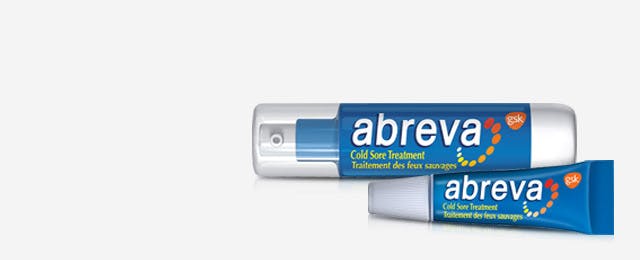ABREVA BASICS
Find answers to frequently asked questions about Abreva Cream, cold sore treatment instructions and much more.
-
WHAT IS THE DIFFERENCE BETWEEN THE ABREVA CREAM TUBE AND PUMP?
-
HOW DO I USE THE ABREVA CREAM PUMP?
To use the Abreva pump for the first time, simply take the top off and press the pump 6 to 8 times to get the first dose. Each time after, just gradually press the pump for the amount you need. You can then apply the cream with a cotton swab or your finger by rubbing it in gently, and the cream will dry clear. But do wash your hands before and after applying the cream.


VIDEO FAQS
see the answer to this question
-
HOW MUCH ABREVA CREAM DISPENSES WITH EACH PUMP?
The pump is designed to dispense the right amount of cream for one application. Gradually press the pump until you get the amount that’s right for you. More cream may be needed when a cold sore is large and less as it gets smaller. It is okay to include the area surrounding the cold sore so it is not wasted.


VIDEO FAQS
see the answer to this question
-
HOW LONG WILL A TUBE OF ABREVA CREAM LAST FOR THE AVERAGE COLD SORE SUFFERER?
Our surveys indicate that one 2.0-gram tube of Abreva cream will last the average cold sore sufferer through 2-3 episodes. Which is a year’s supply for the average sufferer.
However, because the duration of cold sores varies among different individuals, your results may vary. It is important to apply Abreva cream according to the package directions and recommended dosage (avoid trying to “stretch” the product to last for an extra episode).


VIDEO FAQS
see the answer to this question
-
WILL THE SCAB ON MY COLD SORE INTERFERE WITH THE ABSORPTION OF THE ABREVA CREAM? CAN I PEEL THE SCABS ON MY COLD SORE?
Once the scab has formed, your cold sore is nearing its stage of complete healing. Keep applying the Abreva cream for the 10 days, or until the scab has fallen off, whichever is the earliest. We do not recommend peeling the scab. You could damage the new, delicate skin underneath. Let the scab fall off naturally.


VIDEO FAQS
see the answer to this question
-
CAN ABREVA BE USED TO TREAT GENITAL HERPES, CANKER SORES OR SHINGLES? CAN I USE THIS ON CRACKS THAT FORM IN THE CORNERS OF MY MOUTH?
-
HOW THIN OR THICK OF A COATING OF ABREVA CREAM SHOULD I APPLY?
-
CAN I USE ABREVA CREAM LONGER THAN 10 DAYS?
No. It is not recommended for use Abreva cream longer than 10 days. Also, it could be the sign of a more serious infection.
You should contact your doctor if your cold sore has not healed within 10 days while using Abreva cream. Getting the doctor to look at it will ensure that you receive an updated diagnosis and possibly additional treatment.
Cold sores are caused by a viral infection.


VIDEO FAQS
see the answer to this question
-
CAN I APPLY COSMETICS ON TOP OF ABREVA CREAM?
Yes. For best results, remove any cosmetics prior to applying/reapplying Abreva. Then, re-apply lipstick, over Abreva cream. However, use a separate applicator, like a cotton swab, to apply cosmetics or sunscreen over an unhealed cold sore to avoid spreading the infection.
Cold sores are caused by a viral infection.


VIDEO FAQS
see the answer to this question
-
YOUR LABEL WARNING SAYS TO GET MEDICAL HELP IF ABREVA CREAM IS SWALLOWED. WHAT HAPPENS IF I LICK MY LIPS AND SWALLOW SOME OF THE CREAM? WILL THIS HARM ME?
-
CAN I KISS SOMEONE WHILE A COLD SORE IS ON MY LIPS?
Since cold sores are contagious, kissing should be avoided during a cold sore outbreak. Getting up-close and personal spreads cold sores. At any stage of an outbreak, when you kiss your loved ones, especially on the mouth, you’re very likely to pass on the virus. And remember, though not as common, cold sores can spread to other parts of the body, too.


VIDEO FAQS
see the answer to this question
-
WHAT CAN I EXPECT TO HAPPEN IF I GET SOME ABREVA CREAM ON THE SKIN AROUND THE SORE?
-
WHY CAN’T I APPLY ABREVA CREAM INSIDE MY MOUTH OR NOSE?
Mucous membranes inside the mouth and nose are very sensitive and you could experience some irritation. If your cold sore spreads upward to involve the outside of the nostrils, then Abreva cream can be safely applied. It is not recommended that you insert Abreva cream inside the nose.


VIDEO FAQS
see the answer to this question
-
WHAT HAPPENS IF I ACTUALLY GET SOME ABREVA CREAM IN MY MOUTH?
Small amounts of Abreva cream that get just inside the lip/mouth junction by the cold sore should not be a problem. However, if you accidentally place a large amount of cream into your mouth, then remove the cream, rinse out your mouth with water and contact your health professional.


VIDEO FAQS
see the answer to this question
-
WHAT ARE THE COMMON COLD SORE TRIGGERS?
Some of the most common factors that may trigger a cold sore include fatigue, stress, fever, a cold or the flu which can all weaken your immune system making you easy prey for a cold sore outbreak.
Cold weather, dry air, winter wind and ultraviolet rays can also lead to cold sores by drying out lips and damaging your skin.
Lastly, the stress associated with hormonal changes and trauma from dental procedures can also cause cold sores.


VIDEO FAQS
see the answer to this question




